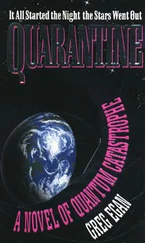‘I mean, now that you can’t do cosmology,’ Celia clarified, holding out the patch for Agata to sign.
‘Exactly,’ Agata agreed, forming her mark and accepting the tool belt from her supervisor. ‘I thought I’d better make myself useful somehow.’
‘Do you think it’s a meteor coming?’ Celia asked phlegmatically.
‘No one can rule that out,’ Agata replied. ‘But I’m still hoping that it’s just a glitch in the system.’
Celia looked sceptical, but she didn’t press Agata for a detailed hypothesis. ‘Don’t take offence,’ she said, ‘but some of the older workers find it helpful to rehearse their resorptions and extrusions before going in.’
‘I’ll try that,’ Agata promised.
She made her way towards the entrance to the cooling system, trying to appear mildly dejected for the surveillance cameras: the woman who’d travelled across the cosmos to confirm Lila’s great theory, reduced to menial labour – and this time with no zealous strike-breaker’s pride. In truth, she was ecstatic that she’d been allowed to take the job. The automated employment system, bless it, had had no idea how far from ‘current’ her experience really was, and more to the point she had clearly not been flagged as any kind of security risk.
Agata dutifully shortened and stretched her legs half a dozen times before fitting her access key to the hatch. As she descended into the cool air of the tunnel she felt a twinge of claustrophobia and her memories of the blast came rushing back. She would never stop mourning Medoro, but she let the grief move through her mind like a familiar presence, with no need for elaborate rituals or acknowledgements.
She made her way up-axis as swiftly as she could, advancing through the blackness, searching the walls for patches of red. Whoever had worked this section before her had been diligent; she saw only the tiny specks of new growth, easily disposed of with a quick flash from her coherer. As far as she knew no one else would be coming here now, but she’d resolved to do a passable job every shift in case there was an unannounced inspection. If her rushed work wasn’t quite as thorough as that of her younger colleagues she could always blame her failing eyesight, but there could be no excuse for great glowing colonies of moss.
She reached the end of her allotted segment of the tunnel with almost a bell to spare, then she turned and raced back towards the start. The hard part was doing it quietly, keeping her feet low and lengthening her strides instead of breaking into a run. People were used to hearing workers in the tunnels, but the sound of outright sprinting might attract attention.
Light from the open hatch marked her entry point, but when she arrived at the ladder she slid the hatch closed above her and waited for her eyes to readapt to the dark. A couple of strides down-axis from the hatch, a hardstone grille covered the width of the tunnel. Peering between the bars she saw nothing: no flashes from the coherer of another tunnel worker burning off moss. Agata hadn’t quizzed Celia about anyone else’s shifts, but she’d chosen the latest of the time slots on offer. It was possible that right now there was no one at all between her and the cooling chamber.
She lay on the floor of the tunnel and rearranged herself so that she could reach down her throat and retrieve the small bundle of tools she’d swallowed. The rags they were wrapped in were covered with clumps of food and digestive resin; she shuddered but managed to avoid emitting a hum of revulsion as she flicked her hand clean.
By touch, Agata confirmed what she’d guessed by sight when the grille had been illuminated: the bars really were embedded in the wall, continuing right into the surrounding stone. The masons must have drilled one hole straight, but created a whole triangular cavity at the opposite point, allowing a rod that was too long to fit directly across the tunnel to be inserted at an angle and then made true. They would have packed the cavity with sand and adhesive, and over time it would have set into something almost as strong as the surrounding calmstone. But though the bars themselves were close to unbreakable, calmstone was just calmstone. Agata put the point of her hand drill against the wall beside the longest of the bars and set to work enlarging the hole that contained it.
By the end of her shift she’d made slots that allowed her to remove and replace three of the bars at will. Two more, and she’d be able to squeeze through.
Agata packed up her tools and forced herself to swallow them again. Beyond the half-disassembled grille and the last segment of the tunnel, there’d be another grille just like it guarding the outlet from the chamber itself. She’d need more time to transit that segment, but the task no longer seemed impossible.
Agata ground the roots with the mortar and pestle she normally used for spices, feeling like some kind of demented kitchen alchemist. The flowers she’d cut up were all decorative species that had been planted around the beds of travellers for generations, in a relic of the old folk belief that their petals’ light had health-giving properties. She had never gone in for the custom herself, but at the garden no one had questioned her. The assistant had invited her to pick whatever she liked.
Every plant root contained substances that bound to a range of minerals. Over the generations, chemists had painstakingly tabulated their properties, species by species, and the appendices to Agata’s school chemistry textbooks were full of such quaint pre-photonic compendia.
The effect she was hoping for was not dramatic; she didn’t need a liberator to set the sunstone in the cooling chamber on fire. All she had to do was ‘poison’ a large enough portion of the surface of the rock. The size of the air particles that the sunstone produced was sensitive to the amount of time the decomposing agent spent in contact with it; if she could weaken the agent’s binding, some lighter air than normal would be produced. The total volume didn’t have to be enormous; the giant centrifuge of the Peerless itself would separate out the less massive component, concentrating it preferentially around the axis.
If she could get enough disruptor into the cooling chamber, the next step would be verification. She would need to be able to quantify the effect of her intervention on the refractive index of the air near the axis, not least to be able to convince Ramiro and Tarquinia to abandon their own efforts. The shift ought to be measurable in principle, but it would require specialised, high-precision instruments. Agata had no idea how she could get her hands on equipment like that without attracting attention – but she was sure that, like every other aspect of the plan, if she remained resolute it would fall into place.
‘You get keener every day,’ Celia observed. ‘I can move you to an earlier shift if you like.’
‘No, this is perfect.’ Agata wasn’t sure how much explanation her early starts required. ‘I just have trouble planning the journey sometimes; if I’m not as energetic it can take me a few more lapses to get here, but if there’s any doubt I’d rather make sure I won’t be late.’
‘Hmm.’ Celia didn’t care. ‘Any new thoughts about the disruption?’
‘I’m still optimistic,’ Agata replied cautiously.
‘You’ve seen the ancestors’ writing,’ Celia acknowledged. ‘Of course that makes you hopeful. But they didn’t tell you how many of us survive.’
‘But nor did they mention a great tragedy,’ Agata replied. ‘They just offered their thanks. If the mountain had been shattered, you’d think they would have aimed for a higher level of solemnity.’
Celia was amused. ‘Six generations on? It will all be ancient history by then. They’ll carve their memorial on Esilio and some politician will make an empty speech.’ She handed Agata her tool belt and access key. ‘No one will know what our lives were really like, and no one will care.’
Читать дальше










